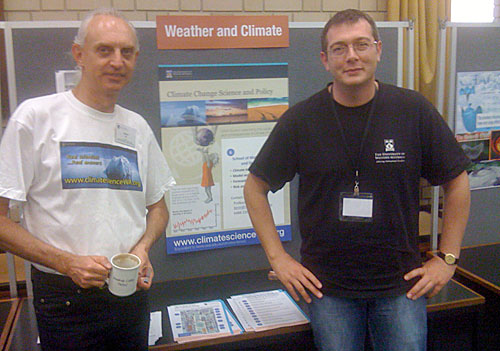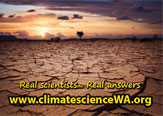University of Western Australia Open Day 2010
Posted on 22 August 2010 by Anne Young
Guest post by Anne Young
As well as displays and information sessions about courses, as well as a rock climbing wall and a whizzy sideshow alley ride, as well as free tea, coffee and biscuits and an all-day tram, the thousands of visitors to the University of Western Australia’s Open Day on Sunday 15th August were afforded an insight into climate change, university style.

Professor Kevin Judd and Dr Thomas Stemler
Visitors, mainly year 12 students and their parents, were invited to take The Climate Walk to discover the many different disciplines that contribute to climate science and help shape climate policies at UWA. Leaflets provided a map and an outline as shown below.
- Oceans Institute
Sustainable development and management of our marine habitats - School of Earth and Environment
Coral reefs and climate change - School of Plant Biology
The impact of climate change on plants and ecosystems - Philosophy, School of Humanities
The ethics of climate change and the nature of science - School of Population Health
Assessing and reducing the health impacts of climate change - School of Mathematics and Statistics
Modelling and forecasting of climate - Faculty of Law
Examining legal responses to mitigate the effects of climate change - Glider Lab, School of Environmental Systems
Monitoring the impact of climate change on our oceans - School of Psychology
Understanding how people understand climate science - Science Communication Program
Interfacing with the media and the public
At each stop, a poster provided further information on the nature of the work in each discipline. Takeaway bumper stickers and fridge magnets were popular as a useful reminder of how to keep in contact with real scientists and real answers (for more information, visit www.climatescienceWA.org).


Click either pic for a higher-rez version
The variety of disciplines involved in working on climate change at UWA, from observing and forecasting the physical changes to considering their impact on people and how we may thoughtfully respond, exemplifies the need for all facets of the wider society to be actively engaged in thinking about and acting on climate change. Prospective students were able to see how they can contribute to tackling climate change, almost irrespective of their academic interests.
The physical sciences are quickly associated with climate change but the role of some schools is less obvious. People with a philosophy background engage with fundamental questions affecting the immediate lives of generations to come. For example, is there an ethical imperative to undertake steps now, even if not in our own interest, that are likely to improve the lives of future generations we will never meet or know? International action may rely on binding legal agreements and an understanding of law is essential as individual and community rights come increasingly under threat. In addition, The Faculty of Law at UWA examines the legalities of CO2 emissions and their regulation. Through the work of psychologists, we understand responses such as denialism and scepticism. For example, research shows that skeptics are more likely to believe true statements than people who are not sceptical: Thus, being a “skeptic” does not translate into the rejection of all things; it means that one acutely differentiates between truths and falsehoods.
The poster image for The Climate Walk was appropriately ambiguous, capturing the notion of stewardship and responsibility that this interdisciplinary approach fosters but also raising the question of whether, as a society, we are acting in the interests of future generations or simply snatching the earth for ourselves whilst we are here.































 Arguments
Arguments























 0
0  0
0






Comments